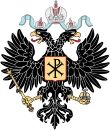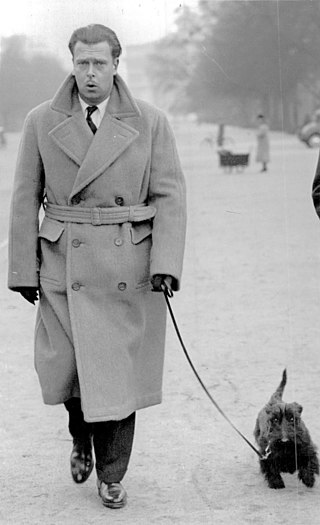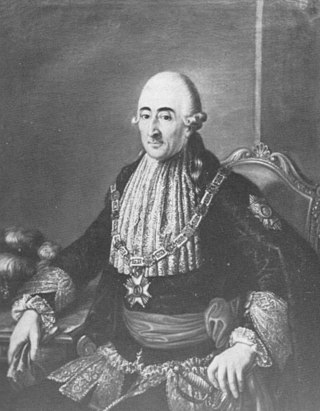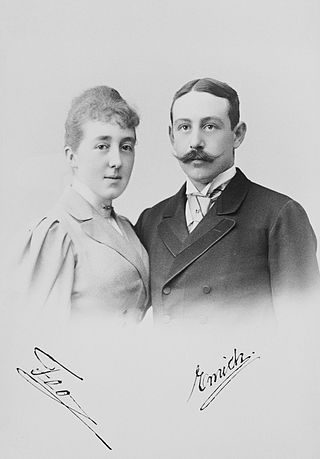Prince Karl Emich of Leiningen
Last updatedYou can help expand this article with text translated from the corresponding article in Russian. (June 2022)Click [show] for important translation instructions.
|
| Karl Emich of Leiningen | |||||
|---|---|---|---|---|---|
| Nicholas III | |||||
 Karl Emich in 2014 | |||||
| Head of the House of Romanov | |||||
| Time | 1 June 2013 – present | ||||
| Predecessor | Grand Duchess Maria Vladimirovna of Russia (regent) | ||||
| Heir presumptive | Prince Andreas (1955–) | ||||
| Archchancellor | Prince Anton Bakov | ||||
| Born | 12 June 1952 Amorbach, West Germany | ||||
| Spouse | Princess Margarita of Hohenlohe-Oehringen (m. 1984;died 1989)Countess Isabelle von und zu Egloffstein (m. 2007) | ||||
| Issue |
| ||||
| |||||
| House | Holstein-Gottorp (cognatic) Leiningen (agnatic) | ||||
| Father | Emich, 7th Prince of Leiningen | ||||
| Mother | Duchess Eilika of Oldenburg | ||||
| Religion | Lutheranism (before 2013) Russian Orthodoxy (since 2013) | ||||
Prince Karl Emich of Leiningen (German : Karl Emich Nikolaus Friedrich Hermann Prinz zu Leiningen; Russian : Карл Эмих Николаус Фридрих Герман цу Лейнинген; born 12 June 1952), also known by his Orthodox Russian name Nikolai Kirillovich Romanov (Николай Кириллович Романов), and recognized with the regnal name Emperor Nicholas III by Monarchist Party supporters of the Imperial Throne, is the eldest son of Emich, 7th Prince of Leiningen and his wife, Duchess Eilika of the Grand Duchy of Oldenburg, and is an elder brother of Andreas, 8th Prince of Leiningen. [1]
Contents
- Marriages and children
- Lawsuit
- Claim to the Russian throne
- Nicholas III and the Imperial Throne
- Ancestry
- References
- Further reading
He is a claimant to the defunct throne of the Russian Empire, held until 1917 by the Imperial House of Romanov, as a grandson of Grand Duchess Maria Kirillovna (1907–1951), eldest child of Grand Duke Kirill Vladimirovich, who claimed the Russian crown from exile in 1924.[ citation needed ] He is a great-great-great-grandson of Emperor Alexander II of Russia and grandnephew of Grand Duke Vladimir Kirillovich of Russia.[ citation needed ] In 2013, the Monarchist Party of Russia declared him the primary heir to the Russian throne upon his conversion from Lutheranism to Eastern Orthodox Christianity, and in 2014 announced the formation of the Imperial Throne , wherein Karl Emich had agreed to assume imperial dignity as Emperor Nicholas III. [2] [3] [ better source needed ] As such, however, he came into competition with the widely recognized pretender to the throne, Grand Duchess Maria Vladimirovna of Russia, who is recognized by the Patriarch of Moscow. [4] [ better source needed ]
He also claimed the headship of the House of Leiningen in the past.[ citation needed ]
Marriages and children

He married Princess Margarita of Hohenlohe-Öhringen on 8 June 1984. He had one daughter by this marriage, Princess Cécilia of Leiningen (born 10 June 1988). [5] Princess Margarita died in 1989 in a car accident. [1]
On 24 May 1991, Prince Karl Emich married morganatically Gabriele Renate Thyssen. [1] After an inheritance dispute, he desisted claim to the family's legacy in favour of his younger brother Andreas, 8th Prince of Leiningen. The couple had one daughter, Princess Theresa Anna Elisabeth of Leiningen (born 16 April 1992) [1] In 1998, Karl Emich and Gabriele were divorced [1] and she became the second wife of the Aga Khan IV.
He married Countess Isabelle von und zu Egloffstein in a civil ceremony on 8 September 2007 in Amorbach, and in a religious ceremony on 7 June 2008 in Pappenheim (her maternal grandmother, Countess Ursula (1927-2018), was the heiress of the Pappenheim estate and a member of the mediatised House of Pappenheim). [6] [7] On 12 April 2010, they had a son, Prince Emich Albrecht Karl of Leiningen. The family lives at Kunreuth castle.[ citation needed ]
Because his marriage to Countess Isabelle would not have been deemed equal according to the Pauline Laws, their son, Prince Emich, though considered a dynast of the House of Leiningen, cannot inherit his claim to the headship of the House of Romanov, which shall pass to his brother, Prince Andreas (1955 - ), and the latter's descendants born of equal marriages upon the death of Karl Emich, and on the condition that they should convert to Orthodoxy. [8] [9]
Lawsuit

In 2000, Karl Emich began the final round of a lawsuit to inherit £100 million worth of castles, property, and a Mediterranean island that had been denied him by his family because he chose to marry Gabriele Renate Thyssen. [10] [11] Karl Emich was disinherited shortly after his 1991 wedding, as his mother, father, and brother Andreas withheld approval, contending that the bride did not meet the mediatized family's traditional standard for aristocratic lineage. [11] The marriage was therefore deemed to constitute a violation of an 1897 Leiningen family edict requiring that dynastically valid marriages be authorised by the head of the Leiningen family (or by successful appeal to a panel of mediatized nobles), [12] such permission historically being granted for brides descended from royalty or the titled nobility. [11] Karl remarked about the whole affair,
"From the very beginning of our marriage I was turned into an enemy. We were both subjected to enormous pressure. No marriage can withstand that sort of thing in the long term. I had hoped things would improve when our child arrived. But after our daughter was born, nothing happened. My mother has refused to speak to me since the wedding". [11]
Karl Emich maintained that the stress this feud put upon his marriage is the reason why Thyssen left him, converted to Islam, and eloped with Aga Khan IV. [11]

Claim to the Russian throne
Karl Emich and his supporters argue that the marriage of Maria Vladimirovna's parents was in contravention of the Pauline Laws. They maintain that the House of Bagration-Mukhrani did not possess sovereign status and was not recognized as equal by Nicholas II for the purpose of dynastic marriages at the time of the union of Princess Tatiana Constantinovna of Russia and Prince Constantine Bagration-Mukhransky in 1911, thirty seven years prior to that of Princess Leonida and Grand Duke Vladimir Kirillovich. [13] Therefore, as the next of kin to Vladimir (in the exclusion of his daughter), the Russian Monarchist Party recognises Karl Emich as the heir to the Russian throne, since he and his wife converted on 1 June 2013, from Lutheranism to Eastern Orthodox Christianity, enabling his accession. [14] The couple received Orthodox names of Nikolai Kirillovich and Yekaterina Fyodorovna.
Nicholas III and the Imperial Throne

In early 2014 Russian Monarchist Party leader Anton Bakov announced he views the "Imperial Throne" from the point of international law as a subject of state sovereignty regardless of any other attributes, referring to analogies with the Holy See. He outlined that Karl Emich, upon adhering to the Orthodox denomination, obtained a right to take this see according to pre-Revolution Fundamental Laws of the Russian Empire. Bakov proposed that the Prince accept the throne, thereby forming a new independent state and incorporate it into Bakov's promotional projects such as the Monarchist Party's Imperial Throne micronation and several others. In April 2014 Bakov and Karl Emich appeared in a newspaper textual and photo report [15] declaring that the Prince accepted the proposals as well as the title of "Emperor Nicholas III" (as successor to Nicholas II). In the report Bakov emphasized that Karl Emich has long been an entrepreneur but henceforth he would refrain from all non-royalist related public activities. The report included a "Manifesto Grant of the Constitution to the State", signed by Nicholas III, proclaiming the formation of the sovereign state "Imperial Throne" aimed at consolidating all the people around the world devoted to Christian monarchism. The see in the documents is viewed as a legacy of the first-ever Christian Roman Imperial Throne of Constantine the Great, deemed to have passed through the Byzantine Empire to the Russian Empire and the House of Romanov by religious process. [16]
Later Bakov announced he has purchased a plot of land in Montenegro to form a location for the new state (80 ha, "twice as big as Vatican" [17] ), and is in negotiations with Montenegro authorities for recognition of the state. He also announced that Russian President Vladimir Putin declined to grant such a plot in Yekaterinburg (Bakov's residence and site of the 1918 Romanov assassination) in response to Karl Emich's request, [18] transmitted to Putin by Bakov, a former MP. [19] In early 2015, as a follow-up to the International sanctions during the Ukrainian crisis, Bakov told the press there are talks with Montenegro authorities to establish an offshore zone at this plot, aimed at providing financial intermediation to Russian companies. [20] Also in 2015 Imperial Throne representatives claimed to be in talks with the authorities of the neighbouring Republic of Macedonia and Albania on possible collaboration and future state recognition. In particular, Bakov met with Macedonian Prime Minister Nikola Gruevski. [21] Later there was a similar talk with President of Gambia Yahya Jammeh at the 70th UN General Assembly session in New York. [22] Also, talks were held with Macedonian and Montenegro Eastern Orthodox clergy — Bakov discusses creation of churches associated with Imperial Throne and proposes canonization of Russian ancient ruler Ivan III and his wife Sophia Palaiologina. Talks with Gaston Browne, Prime Minister of Antigua and Barbuda, also took place. [23] In early 2017 it was announced by many world mass media [24] [25] [26] [27] that there is a preliminary consent of the government of Kiribati to sell three inhabited Pacific islands to Bakov to set up the state which is expected to be renamed to Romanov Empire. Kiribati rejected the proposal in February 2017. [28]
In December 2017, Bakov announced that the purchase of artificial islands belonging to the Republic of The Gambia had been successfully negotiated and the Romanov Empire had become a partially recognised country. [29] The claim was denied by the Gambian government. [30]
In June 2021 Karl Emich, or Nikolai Kirillovich (Nicholas III) gave his first-ever interview in Russian language where he clarified his civil and political attitude and told some details about history of his family. [31]
Ancestry
| Ancestors of Prince Karl Emich of Leiningen | |||||||||||||||||||||||||||||||||||||||||||||||||||||||||||||||||||||||||||||||||||||||||||||||||||||||||||||||||||||||||||||||||||||||||||||||||||||||||||||||||||||||||||||||||||||||||||||||||||||||||||||||||||||||||||||||||||||||||||||||||||||||||||||||||||||||||||||||||||||||||
|---|---|---|---|---|---|---|---|---|---|---|---|---|---|---|---|---|---|---|---|---|---|---|---|---|---|---|---|---|---|---|---|---|---|---|---|---|---|---|---|---|---|---|---|---|---|---|---|---|---|---|---|---|---|---|---|---|---|---|---|---|---|---|---|---|---|---|---|---|---|---|---|---|---|---|---|---|---|---|---|---|---|---|---|---|---|---|---|---|---|---|---|---|---|---|---|---|---|---|---|---|---|---|---|---|---|---|---|---|---|---|---|---|---|---|---|---|---|---|---|---|---|---|---|---|---|---|---|---|---|---|---|---|---|---|---|---|---|---|---|---|---|---|---|---|---|---|---|---|---|---|---|---|---|---|---|---|---|---|---|---|---|---|---|---|---|---|---|---|---|---|---|---|---|---|---|---|---|---|---|---|---|---|---|---|---|---|---|---|---|---|---|---|---|---|---|---|---|---|---|---|---|---|---|---|---|---|---|---|---|---|---|---|---|---|---|---|---|---|---|---|---|---|---|---|---|---|---|---|---|---|---|---|---|---|---|---|---|---|---|---|---|---|---|---|---|---|---|---|---|---|---|---|---|---|---|---|---|---|---|---|---|---|---|---|---|---|---|---|---|---|---|---|---|---|---|---|---|---|---|---|---|
| |||||||||||||||||||||||||||||||||||||||||||||||||||||||||||||||||||||||||||||||||||||||||||||||||||||||||||||||||||||||||||||||||||||||||||||||||||||||||||||||||||||||||||||||||||||||||||||||||||||||||||||||||||||||||||||||||||||||||||||||||||||||||||||||||||||||||||||||||||||||||
Related Research Articles

The House of Romanov was the reigning imperial house of Russia from 1613 to 1917. They achieved prominence after Anastasia Romanovna married Ivan the Terrible, the first crowned tsar of all Russia. Nicholas II and his immediate family were executed in 1918, but there are still living descendants.

A pretender is someone who claims to be the rightful ruler of a country although not recognized as such by the current government. The term is often used to suggest that a claim is not legitimate. The word may refer to a former monarch or a descendant of a deposed monarchy, although this type of claimant is also referred to as a head of a house.

Grand Duke Kirill Vladimirovich of Russia was a son of Grand Duke Vladimir Alexandrovich of Russia, a grandson of Emperor Alexander II and a first cousin of Nicholas II, Russia's last emperor. He was also the uncle of Princess Marina, Duchess of Kent.

Grand Duke Vladimir Kirillovich of Russia was the Head of the Imperial Family of Russia, a position which he claimed from 1938 to his death.

Grand Duchess Maria Vladimirovna of Russia has been a claimant to the headship of the House of Romanov, the Imperial Family of Russia since 1992. She is a great-great-granddaughter in the male line of Emperor Alexander II of Russia. Although she has used Grand Duchess of Russia as her title of pretence with the style Imperial Highness throughout her life, her right to do so is disputed. Since her father's death on April 21, 1992, some of her monarchist supporters have referred to her as Maria I, titular "Empress of Russia", a title she does not claim herself.
Grand Duke George Mikhailovich of Russia is the heir apparent to Maria Vladimirovna, a claimant to the disputed Headship of the Imperial Family of Russia. He is the only child of Maria and her former husband, Prince Franz Wilhelm of Prussia. George's mother attributes to him the title of Tsesarevich and he bears, as a title of pretence, the prefix of "Grand Duke" with the style of Imperial Highness which is still being questioned. As the son of a cadet member of the branch of the House of Hohenzollern which formerly ruled the German Empire and Kingdom of Prussia, he is also sometimes entitled "Prince of Prussia" with the style of Royal Highness.
Pappenheim was a German county in western Bavaria, Germany, located on the Altmühl river between Treuchtlingen and Solnhofen, and south of Weißenburg. As former sovereign family, mediatized to Bavaria in 1806, the family which ruled the state belongs to High nobility.
Nicholas Romanovich Romanov was a claimant to the headship of the House of Romanov and president of the Romanov Family Association. Although undoubtedly a descendant of Emperor Nicholas I of Russia, his claimed titles and official membership in the former Imperial House were disputed by those who maintained that his parents' marriage violated the laws of the Russian Empire.

Grand Duchess Leonida Georgievna Romanova of Russia was the consort of Vladimir Kirillovich, Grand Duke of Russia, a pretender to the Russian throne. She was aims advanced by Vladimir and their daughter, Maria Vladimirovna, to be accepted as the legitimate Heads of the Romanov dynasty and de jure sovereigns of the Russian Empire.

Maria Kirillovna of Russia was the eldest daughter of Grand Duke Kirill Vladimirovich of Russia and Princess Victoria Melita of Edinburgh. She was born in Coburg when her parents were in exile because their marriage had not been approved by Tsar Nicholas II. She was generally called "Marie," the French version of her name, or by the Russian nickname "Masha". The family returned to Russia prior to World War I, but was forced to flee following the Russian Revolution of 1917.

Carl Friedrich Wilhelm, Prince of Leiningen was a Prince of the Holy Roman Empire and the first ruler of the Principality of Leiningen.

The title of Prince of Leiningen was created by the Holy Roman Emperor Joseph II, who elevated Carl Friedrich Wilhelm, Count of Leiningen-Dagsburg-Hardenburg to the rank of Reichsfürst on 3 July 1779. Together with all other titles of nobility in Germany, it was abolished with the 1919 Weimar Constitution.

Karl, Prince of Leiningen, KG was the third Prince of Leiningen and maternal half-brother of Queen Victoria. Leiningen served as a Bavarian lieutenant general, before he briefly played an important role in German politics as the first Prime Minister of the Provisorische Zentralgewalt government formed by the Frankfurt Parliament in 1848.

Prince Nikita Alexandrovich of Russia was the third son and fourth child of Grand Duke Alexander Mikhailovich of Russia and Grand Duchess Xenia Alexandrovna of Russia. He was a nephew of Tsar Nicholas II of Russia.

Anton Alekseyevich Bakov is a Russian businessman, monarchist politician, traveler, writer and human rights activist. He is the chairman of the Russian Monarchist Party, was a member of the 4th convocation of the State Duma of Russia from 2003 to 2007 and was a candidate at 2018 Russian presidential election. Due to being known for a long series of unusual political projects such as Ural franc, the writer Alexei Ivanov coined him a "political Leonardo".
Emich Kyrill, Prince of Leiningen was a German entrepreneur and son of Karl, Prince of Leiningen. He was the 7th Prince of Leiningen from 1946 until his death in 1991.

Karl, Prince of Leiningen was a German military officer and the eldest surviving son of Emich, Prince of Leiningen. Upon his father's death in 1939, he became the sixth Prince of Leiningen.

Emich, Prince of Leiningen was the son of Ernst, Prince of Leiningen. He was the fifth Prince of Leiningen from 1904 to 1918, and afterwards titular Prince of Leiningen from 1918 until his death.

The Monarchist Party of Russia is a monarchist political party that was created in 2012 by prominent politician and businessman Anton Bakov, a former member of Russia's State Duma. It declares its aim as the restoration of the monarchy in the country, while transforming it into a modern constitutional one "with full accordance to democratic procedures and current laws", as well as promoting the monarchist conception among Russians and other people of the world.
The Romanov Empire, also known as the Imperial Throne, formerly the Russian Empire, is a micronation proposed by Russian businessman and politician Anton Bakov as a re-creation of the Russian Empire. It would be led by Romanov heir Prince Karl Emich of Leiningen as Emperor Nicholas III, with Bakov serving as Archchancellor.
References
- 1 2 3 4 5 Genealogisches Handbuch des Adels, Fürstliche Häuser XVII. "Hohenlohe". C.A. Starke Verlag, 2004, pp. 191, 249–251. ISBN 3-7980-0833-7.
- ↑ http://imperor.net/en/latest-news/anton-bakov-establishment-state-russian-empire/ Archived 2016-03-05 at the Wayback Machine , http://imperor.net/en/latest-news/leynina-kingdom/ Archived 2016-10-18 at the Wayback Machine
- ↑ "Romanov Empire". romanovempire.com. Retrieved 2024-03-05.
- ↑ (Gundyayev), Kirill. "Patriarch of Moscow and All Russia". imperialhouse.ru. Retrieved 26 October 2018.
- ↑ Princess Cécilia is the only of Karl Emich's children to be born in conformity with the Pauline laws, and therefore retains her succession rights to his claim to the defunct Russian throne. Notwithstanding, due to semi-salic law, she is bypassed by all male dynasts of the House Leiningen who claim descent from Maria Kirillovna of Russia, and were born of equal marriages (according to the aforementioned Pauline laws).
- ↑ Hans Schwackenhofer, Die Reichserbmarschälle, Grafen und Herren von und zu Pappenheim. Zur Geschichte eines Reichsministerialengeschlechtes (Beiträge zu Kultur und Geschichte von Stadt, Haus und ehemaliger Herrschaft Pappenheim 2), Treuchtlingen u. a. 2002.
- ↑ Albeit being the heiress of the Pappenheim estate and the last linear descendant of the main branch of the family, Countess Ursula could not succeed to the headship of the House due to salic law. Her daughter, Countess Iniga von der Recke-Volmerstein (b. 1952) is Isabelle von Egloffstein's mother and the inheritor of all the Pappenheim possessions, though the headship itself passed to a Hungarian collateral branch, currently represented by Albert, Count of Pappenheim (b. 1943).
- ↑ "The Heir to the All-Russian Emperorship, His Highness Prince of the Imperial Blood Nikolay Kirillovich of Russia, Prince zu Leiningen". The Imperial Heraldy. Retrieved January 6, 2022.
- ↑ Karl Emich's marriage to Countess Isabelle von und zu Egloffstein is considered dynastic according to the rules of the House of Leiningen, as it is only required that their spouses should belong to an old noble family for the union to be deemed equal. However, the Pauline laws are more strict in that regard, and require that the spouse of a Russian Prince of the Blood should belong to a Sovereign House. Therefore, the marriage is considered morganatic according to Russian tradition, and their son cannot inherit his father's claims. Prince Emich Albrecht , however, is an undisputed dynast of the House of Leiningen, albeit not possessing succession rights, since his father was deprived of them in the 1990s.
- ↑ These included the Mediterranean island of Tagomago, two stately homes in Bavaria and the Rhineland, and estates in Africa and Canada (Paterson, Tony).
- 1 2 3 4 5 Paterson, Tony (22 June 2000), "A Pauper Prince's Palatial Quest", The Guardian, Berlin, retrieved 8 September 2010
- ↑ JustizMinBekanntm. 'LHEntschließung vom 2 September 1898 "vorbehaltlich der landesherrlichen Rechte und der Rechte Dritter"'. 22 September 1898. Gbl. S. 437, 438.
- ↑